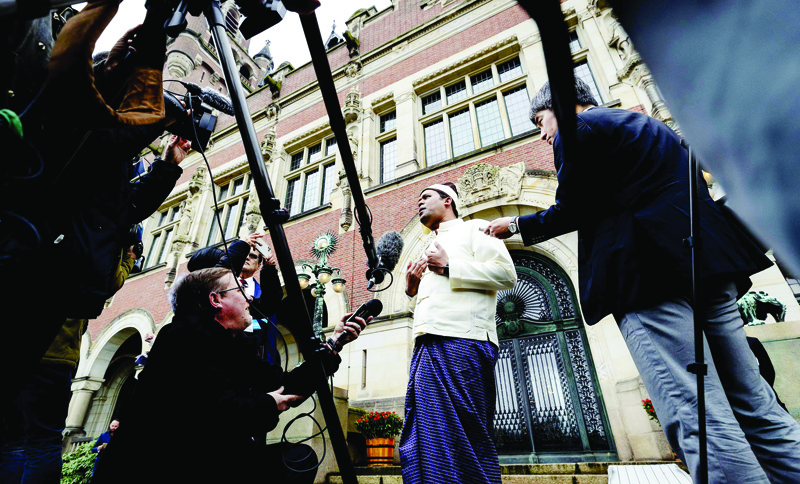
THE HAGUE, Netherlands: The UN's highest court ordered Myanmar yesterday to do everything in its power to prevent the alleged genocide of Rohingya Muslims, as international justice stepped into the crisis for the first time. The International Court of Justice rejected arguments made by Myanmar's civilian leader Aung San Suu Kyi in The Hague in December and set out urgent steps for the majority Buddhist nation to end the violence.
The mainly Muslim African state of The Gambia had asked the court to impose emergency measures following a 2017 military crackdown by Myanmar that sent around 740,000 Rohingya fleeing into neighboring Bangladesh. Presiding judge Abdulqawi Ahmed Yusuf said that "the court was of the opinion that the Rohingya in Myanmar remain extremely vulnerable" and needed to be protected from further bloodshed.
Thousands are suspected to have been killed in the crackdown and refugees brought widespread reports of rape and arson by Myanmar's military and local Buddhist militias. The court ordered Myanmar to "take all measures within its power to prevent the commission of all acts" described by the 1948 UN Genocide Convention, under which Gambia brought the case.
These acts included "killing members of the group" and "deliberately inflicting on the group conditions of life calculated to bring about its physical destruction in whole or in part." The court ordered Myanmar to report back within four months, and then every six months after that. It also told Myanmar to prevent the destruction of any evidence of crimes against the Rohingya.
'Historic day'
The Gambia asked the court - set up after World War II as the UN's top judicial organ to rule in disputes between nations - for the measures pending a full case that could take years. Gambian justice minister Abubacarr Tambadou hailed the court's decision to uphold his country's case, which was supported by the 57-nation Organization for Islamic Cooperation, Canada and the Netherlands. "This is a historic day today, not just for international law, for the international community, but especially for the Rohingya," he told reporters outside the court.
Nobel peace laureate Suu Kyi - who was widely criticized for her defense of the same military that once locked her up for years - said yesterday that some Rohingya refugees may have "exaggerated" the extent of the abuses. "The international justice system may not yet be equipped to filter out misleading information before shadows of incrimination are cast over entire nations and governments," she wrote in an opinion piece in the Financial Times published ahead of the ruling.
Suu Kyi also said Myanmar should have time to act on the results of an internal investigation by the country, which this week admitted war crimes may have been committed but ruled out genocide. The military dodged questions in the capital Naypyidaw yesterday morning, with a spokesman telling reporters it would simply "follow the instructions of the government".
'First taste of justice'
The result was also hailed in the Bangladeshi camps where some 600,000 people still remain. "It's a great day for us," Mayyu Ali, a Rohingya author and poet, told AFP by telephone from Cox's Bazaar. "When the international court made its ruling today, I felt the gate of justice had been opened. I have the first taste of justice." Rights groups also hailed the ICJ ruling while calling on the international community to put pressure on Suu Kyi and Myanmar.
Tun Khin, president of the Burmese Rohingya Organisation UK, who was dressed in traditional Rohingya clothing, said outside court: "The international community has to push to comply Burma with these provisional measures, otherwise (the) Rohingya will be much more destroyed." "Today's decision sends a message to Myanmar's senior officials: the world will not tolerate their atrocities," Amnesty International's Regional Director Nicholas Bequelin said.
The ICJ's orders are binding but it has no power to enforce them. However the "significance… shouldn't be written off," said Cecily Rose, assistant professor in international law at Leiden University in the Netherlands. "The court's orders and judgments tend to carry relatively great authority or legitimacy. Even though the situation in Myanmar is highly political and fragile, international law still plays a role by informing decision-making among international actors," she said. - AFP










